The Health bulletin [serial] - University of North Carolina at Chapel Hill
The Health bulletin [serial] - University of North Carolina at Chapel Hill
The Health bulletin [serial] - University of North Carolina at Chapel Hill
Create successful ePaper yourself
Turn your PDF publications into a flip-book with our unique Google optimized e-Paper software.
June, 1927 <strong>The</strong> <strong>Health</strong> Bulletin 21<br />
personal hygiene, the teacher's health<br />
and first aid. <strong>The</strong> fe<strong>at</strong>ure th<strong>at</strong> makes<br />
this course differ from those ordinarily<br />
given is the practice demanded by the<br />
actual inspection <strong>of</strong> children for possible<br />
defects, in vision, hearing, teeth,<br />
thro<strong>at</strong>, weight and in making records<br />
<strong>of</strong> conditions found. Instructors are<br />
asked to impress upon their students<br />
th<strong>at</strong> rhe inspections required <strong>of</strong> teachers<br />
does not <strong>at</strong> all mean an examin<strong>at</strong>ion,<br />
but only an intelligent inspection<br />
<strong>of</strong> their pupils in order to detect<br />
obvious physical defects, and visible<br />
symptoms <strong>of</strong> disease, so as to inform<br />
parents <strong>of</strong> the existence <strong>of</strong> such handicaps<br />
to school work, and to recommend<br />
medical <strong>at</strong>tention. <strong>North</strong> <strong>Carolina</strong><br />
needs such a law as this if we are to<br />
continue to progress in medical school<br />
inspection,"'the removal <strong>of</strong> physical defects,<br />
the teaching <strong>of</strong> personal hygiene,<br />
and the prevention and control <strong>of</strong> contagious<br />
diseases.<br />
Farm Tenancy Important Item<br />
Next to the lack <strong>of</strong> educ<strong>at</strong>ion in m<strong>at</strong>ters<br />
pertaining to public health in the<br />
rural sections <strong>of</strong> our St<strong>at</strong>e, probably<br />
the gre<strong>at</strong>est obstacle to public health<br />
progress is the poor economic st<strong>at</strong>us <strong>of</strong><br />
a large per cent <strong>of</strong> our rural people.<br />
One hundred and twenty-eight thousand<br />
<strong>of</strong> our farmers own no land and<br />
belong to the tenant class. Forty-five<br />
per cent <strong>of</strong> the farms in <strong>North</strong> <strong>Carolina</strong><br />
are oper<strong>at</strong>ed by tenants, and a<br />
still gre<strong>at</strong>er per cent in other Southern<br />
St<strong>at</strong>es, except Tennessee. It is obvious<br />
th<strong>at</strong> the tenant farmer, constituting as<br />
he does, so large a proportion <strong>of</strong> our<br />
rural popul<strong>at</strong>ion, must pr<strong>of</strong>oundly influence<br />
the social, moral and health<br />
conditions <strong>of</strong> our rural people. <strong>The</strong><br />
character <strong>of</strong> this influence will depend<br />
largely upon an intelligent and symp<strong>at</strong>hetic<br />
consider<strong>at</strong>ion <strong>of</strong> the tenant<br />
farmer and his problems, by the St<strong>at</strong>e<br />
and local governments, the land owners,<br />
and all social and welfare agencies.<br />
<strong>The</strong>re is no doubt th<strong>at</strong> the farm tenant<br />
system is detrimental to the people<br />
<strong>of</strong> our St<strong>at</strong>e, from a public health as<br />
well as an economic standpoint. <strong>The</strong><br />
influence <strong>of</strong> the tenant class on public<br />
health in the rural sections is reflected<br />
in the high incidence <strong>of</strong> typhoid fever<br />
and bacillary dysentery each year.<br />
Problem <strong>of</strong> Further Typhoid Reduction<br />
in Rural Sections<br />
<strong>The</strong> reduction <strong>of</strong> the de<strong>at</strong>h r<strong>at</strong>e in<br />
typhoid fever from 35.8 per one hundred<br />
thousand in 1914 to 9.8 per hundred<br />
thousand in 1925, has had a gre<strong>at</strong><br />
deal to do with the popularity and<br />
success <strong>of</strong> public health work in <strong>North</strong><br />
<strong>Carolina</strong>, but it is doubtful if the present<br />
r<strong>at</strong>e <strong>of</strong> typhoid fever and bacillary<br />
dysentery can be changed in the rural<br />
sections, until the thousands <strong>of</strong> rural<br />
homes, particularly those <strong>of</strong> the farm<br />
tenants, are provided with <strong>at</strong> least the<br />
fundamental necessities <strong>of</strong> disease prevention,<br />
namely safe w<strong>at</strong>er supplies,<br />
sanitary privies and screened homes. A<br />
sanitary privy and a deep driven well<br />
properly loc<strong>at</strong>ed, can be provided <strong>at</strong> any<br />
rural home with very little expense. I<br />
have seen owners <strong>of</strong> large plant<strong>at</strong>ions<br />
spend enough money in one year for<br />
medicine and pr<strong>of</strong>essional services, in<br />
cases <strong>of</strong> typhoid fever and colitis<br />
among tenant families to provide sanitary<br />
privies and safe wells for all the<br />
tenant homes on the farm. <strong>The</strong> tenant<br />
as a rule has to pay these oblig<strong>at</strong>ions,<br />
the result largely <strong>of</strong> the neglect <strong>of</strong> the<br />
land owner to provide the ordinary<br />
means <strong>of</strong> protection.<br />
You are familiar with the many obstacles<br />
met with in trying to protect<br />
the tenant class <strong>of</strong> people from disease.<br />
<strong>The</strong> general public, particularly the<br />
large land owners must be better educ<strong>at</strong>ed<br />
along this line. We must show<br />
them th<strong>at</strong> from an economic standpoint<br />
it is cheaper to provide their<br />
tenants with safe w<strong>at</strong>er and proper<br />
sewage disposal. An old L<strong>at</strong>in proverb<br />
says "as is the commander so is<br />
the soldiers." In the m<strong>at</strong>ter <strong>of</strong> public<br />
health "as is the land owner so is the<br />
tenant." If the landlord is interested<br />
and cooper<strong>at</strong>ive the tenants will usually<br />
be int^ested.<br />
Breast Feeding<br />
An eminent health authority has<br />
said th<strong>at</strong> the fundamental work <strong>of</strong> a<br />
health department is to change customs<br />
and habits. If this be true we still have<br />
many problems ahead <strong>of</strong> us. So another<br />
problem which I present for your consider<strong>at</strong>ion<br />
is the weaning <strong>of</strong> babies<br />
without cause, and the nursing <strong>of</strong>


![The Health bulletin [serial] - University of North Carolina at Chapel Hill](https://img.yumpu.com/33495252/187/500x640/the-health-bulletin-serial-university-of-north-carolina-at-chapel-hill.jpg)
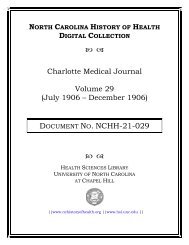
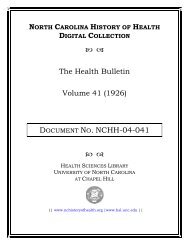
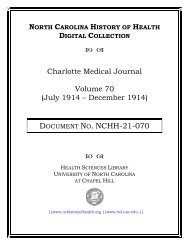
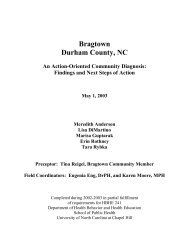
![Bulletin of the North Carolina Board of Health [serial] - University of ...](https://img.yumpu.com/48032016/1/153x260/bulletin-of-the-north-carolina-board-of-health-serial-university-of-.jpg?quality=85)
![The Health bulletin [serial] - University of North Carolina at Chapel Hill](https://img.yumpu.com/47603625/1/169x260/the-health-bulletin-serial-university-of-north-carolina-at-chapel-hill.jpg?quality=85)
![The Health bulletin [serial] - University of North Carolina at Chapel Hill](https://img.yumpu.com/47242858/1/169x260/the-health-bulletin-serial-university-of-north-carolina-at-chapel-hill.jpg?quality=85)
![The Health bulletin [serial] - University of North Carolina at Chapel Hill](https://img.yumpu.com/43204263/1/172x260/the-health-bulletin-serial-university-of-north-carolina-at-chapel-hill.jpg?quality=85)
![The Health bulletin [serial] - University of North Carolina at Chapel Hill](https://img.yumpu.com/41981074/1/163x260/the-health-bulletin-serial-university-of-north-carolina-at-chapel-hill.jpg?quality=85)
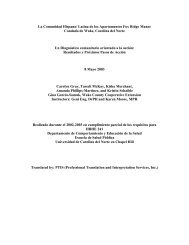
![The Health bulletin [serial] - University of North Carolina at Chapel Hill](https://img.yumpu.com/40912928/1/164x260/the-health-bulletin-serial-university-of-north-carolina-at-chapel-hill.jpg?quality=85)
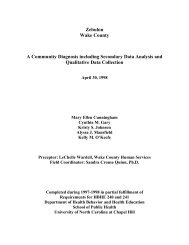
![The Health bulletin [serial] - University of North Carolina at Chapel Hill](https://img.yumpu.com/35643061/1/167x260/the-health-bulletin-serial-university-of-north-carolina-at-chapel-hill.jpg?quality=85)
![Biennial report of the North Carolina State Board of Health [serial]](https://img.yumpu.com/34024350/1/166x260/biennial-report-of-the-north-carolina-state-board-of-health-serial.jpg?quality=85)
